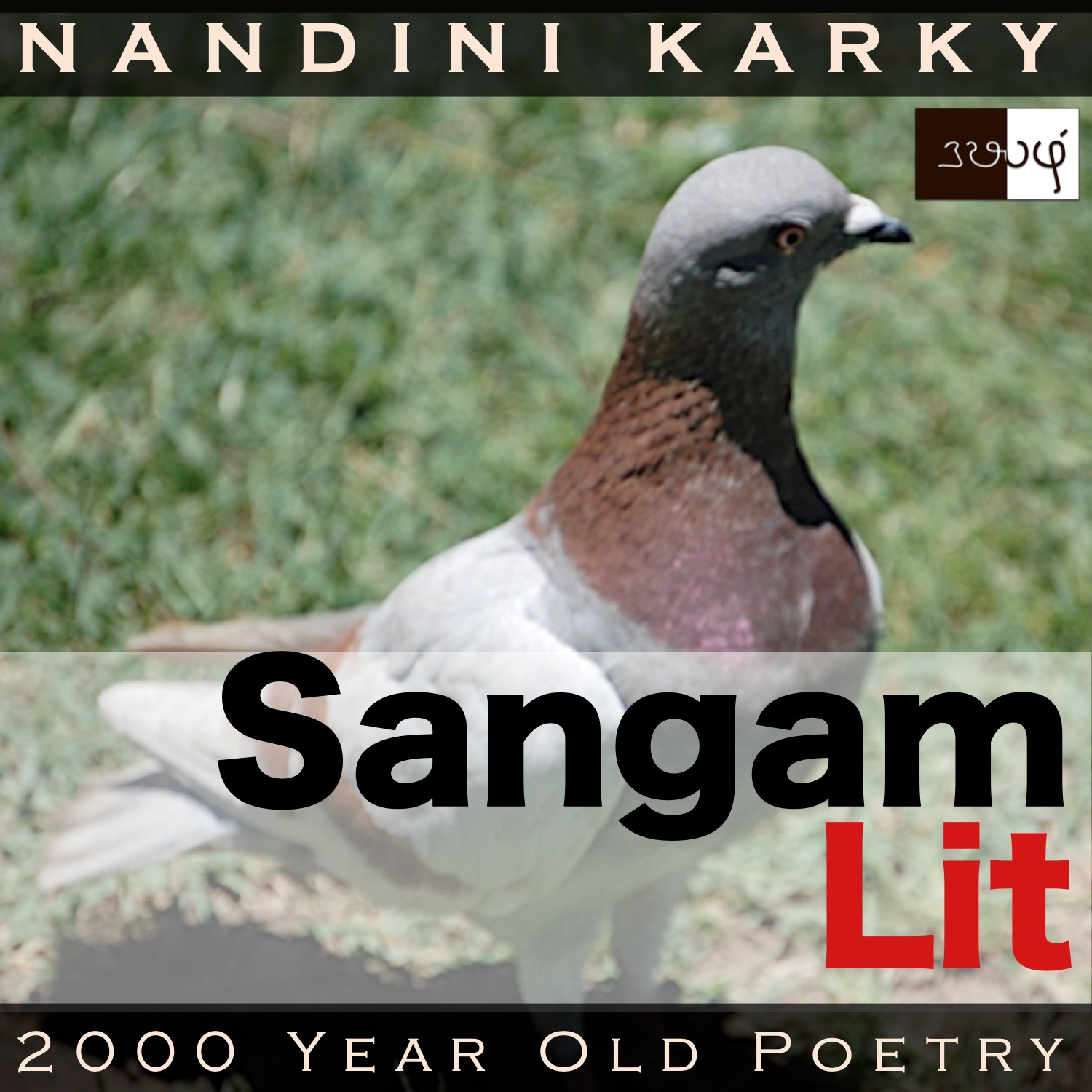Podcast: Play in new window | Download
Subscribe: Apple Podcasts | Spotify | Amazon Music | Android | iHeartRadio | Email | TuneIn | RSS | More

In this episode, we receive a lesson in the art of consolation, as portrayed in Sangam Literary work, Natrinai 189, penned by an anonymous poet. The verse is set in the ‘Paalai’ landscape or the drylands and speaks in the voice of the confidante to the lady, conveying words of solace to her pining heart.
தம் அலது இல்லா நம் நயந்து அருளி
இன்னும் வாரார்; ஆயினும், சென்னியர்,
தெறல் அருங் கடவுள் முன்னர், சீறியாழ்
நரம்பு இசைத்தன்ன இன் குரற் குருகின்
கங்கை வங்கம் போகுவர்கொல்லோ-
எவ் வினை செய்வர்கொல் தாமே?-வெவ் வினைக்
கொலை வல் வேட்டுவன் வலை பரிந்து போகிய
கானப் புறவின் சேவல் வாய் நூல்
சிலம்பி அம் சினை வெரூஉம்,
அலங்கல் உலவை அம் காடு இறந்தோரே?
As it opens, the verse echoes a feeling of immense trust with the words ‘தம் அலது இல்லா’ meaning ‘no life without him’. Then, we learn another word for a tribe of ‘bards’ in ‘சென்னியர்’. The phrase ‘தெறல் அருங் கடவுள்’ surprised me, as ‘god’ is referred to, not as one who protects, but as ‘one who destroys’. When musicians are around, can musical instruments be left behind? There’s a ‘சீறியாழ்’ or ‘small lute’ referred to, in this verse. Most striking of all elements here, is the phrase ‘கங்கை வங்கம்’, which means ‘a boat on the River Ganges’. More on this, in a while! ‘வாய் நூல் சிலம்பி’ is an expression meaning ‘threads from the mouth of a spider’ and in other words, a ‘spider web’. Now, time to study the story woven by this web of a verse.
The man and lady have been leading a happy married life when circumstances arise such that the man must part with the lady to go on a mission. Although the lady bids him success and farewell, she starts pining for him. Seeing the lady in sadness, the confidante says to her, “Showering compassion on you, who has no one but him, he has not yet returned. But, do you think he will climb on a boat on the River Ganges and go elsewhere? That River Ganges, where sweet voiced birds sing akin to the music from little lutes played by bards before fierce gods. What work do you think he has there, away from you? Tearing apart a net cast by a hunter, who is capable of destructive deeds of murder, the male, forest pigeon escapes. But, stands frightened, facing a web, spun by the threads from the mouth of a spider aloft a branch, in the forest filled with dry winds, where walks your man!” With these words, the confidante stresses on the fact that the man will return the moment his task is over to bring joy to the lady’s heart.
Let’s unravel the intricate elements woven in this verse. The confidante first establishes the importance of the man to the lady’s life saying she has no one but him. He knows that too. Yes, the confidante says, he has not yet returned. She adds an emphatic ‘But, still’ and she continues. The first scene she lays out before our eyes is that of bards singing before gods with little lutes. Turns out, the music from these lutes is a simile for the voice of birds by the River Ganges. Imagine travelling to the shore of the River Ganges, two thousand years ago. How much cleaner would the waters have been! Could there be a chance that the Gangetic dolphin hadn’t turned blind yet? While the song says nothing about those dolphins, it does say, sweet-voiced birds shroud the skies above the Ganges. And, this tells us how rich the flow of the river should have been, teeming with life! Returning to the verse, why is this confidante, who lives in Tamil land, talking of a river, 2000 km away. She refers to the river to say that the man wouldn’t have climbed on a boat sailing on the River Ganges and gone elsewhere, forgetting the lady! A moment’s pause to reflect on the word ‘Vangam’ for a ‘boat’. The Tamils, who were expert sailors seem to have had not just land contact but maritime contact with Northern India and the port of entry, was probably the Sunderbans, where the River Ganges meets the Bay of Bengal. The word for the vessel which helps them enter the region is ‘Vangam’ and note how it is phonetically similar to ‘Banga’, the origin word of ‘Bengal’. Bengalis and Tamils have many similarities, one being their ardent respect for language and literature. Perhaps, the threads that link the two lands extend far beyond what we can fathom now.
Speaking of threads, let’s get back to the verse, where the confidante is now describing a scene in the forest where the man walks. There, a pigeon stands scared by the sight of a spider web. This very pigeon had the strength and smarts to tear a net, spun by the hands of a fierce hunter, and yet, now it stands frightened by the web, spun by tiny spider, on the branch of the tree. The confidante sketches this scene as a metaphor to remind the lady that akin to the escape from the hunter’s skilful net, the lady had borne with the separation of the man, in the time of their courtship, when he had to part away to gather wealth. But now, the lady seems to stand scared at a mere spider web – this parting happening in the security of their married life. Thus, with this vivid image from nature, the confidante points out to the lady that she has the strength to bear this, as she has borne with a more dangerous separation in the past. A cue for us to remember when in anxiety, of how we have faced something in the past, so as to gather confidence to move past that moment of fear!




Share your thoughts...